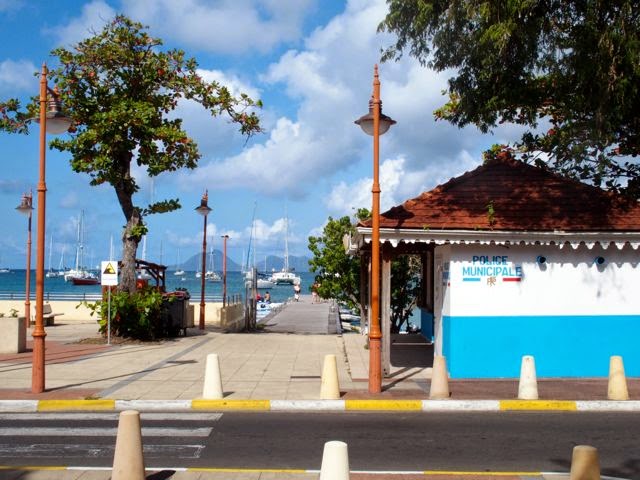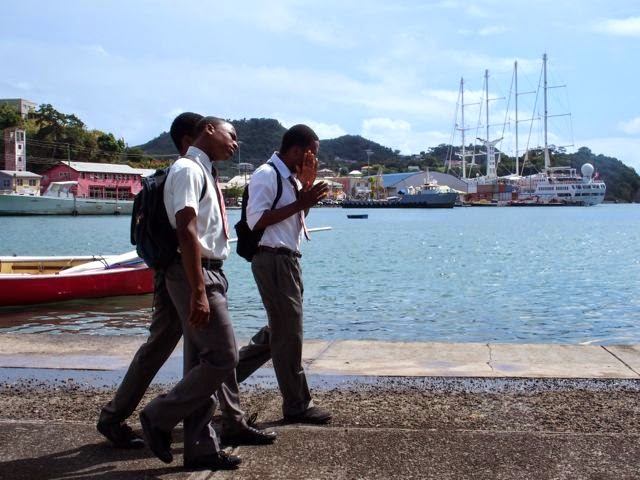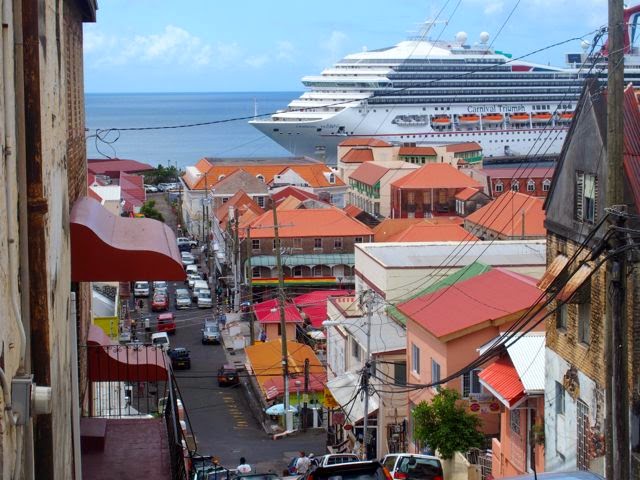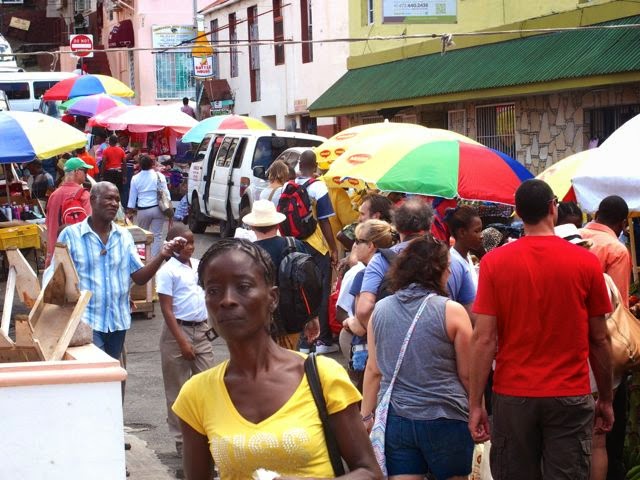 |
| Portsmouth, Dominica (and below) |
 |
| A different kind of yacht - motor sailing out of the Saints anchorage |
We’re picking our way south
through the eastern Caribbean pond like frogs hopping between lily pads. We estimate the length of the jump, and the
conditions for making it, we launch ourselves, and three or four hours later,
sometimes longer, we land. Plop. Another
country. Another set of formalities (and
another internet barrier). We’re beginning to get a feeling for how things roll
in the pond. We’re beginning to distinguish variations in the pond too. Not all
lily pads are the same.
 |
| Prince Rupert Bay anchorage at Portsmouth |
 |
| Most people apparently recognise this hut on the Indian River |
 |
| Our guide, Sea Bird (Jeffrey) told us we were the first people he'd ever met who'd never seen the movies made on the river - Pirates of the Caribbean 2 and 3 |
Yesterday we hopped over from
Roseau, on Dominica, to St Pierre on Martinique. You couldn’t pick two more
different lily pads, though both are in glorious natural settings (the pond is
beautiful – that goes without saying) and both have or had the title “island
capital”.
 |
| Main street Roseau |
 |
| Government House, Dominica |
 |
| Public library, Roseau |
Roseau is a dirt poor place
with a smattering of self-important institutions.
A parliament. A university. A national broadcaster. A cricket stadium. Tourists come for what’s outside the town, the
waterfalls and jungle, the mountains, the parrots, the sulphur springs, but for
us this time it was the life on the street we saw. The roads barely paved but
thick with traffic. The people congregated on the narrowest of footpaths (or in
the deep gutters), sitting alone in deep shade on the lush grass of the botanic
gardens, idling on the verandah of the many-sided public library, crouching on
doorsteps almost in the road. The way they moved their bodies, even those on
crutches, or pushing carts. Sensually. Their habit of greeting you as you
walked by, even the young toughs. Especially the young toughs. “Hello sweetheart,” a hand extended.
 |
| Roseau |
(Alex was feeling a bit off colour while we were in Roseau, so I'm switching for to a set of photos he took at the market in Portsmouth, in the north of the island - you could transplant the people to Roseau, I think, though perhaps I'm taking liberties here).
I don’t imagine that St
Pierre ever felt like Roseau, though it too was once an island capital. St Pierre measured itself by European
standards. It had an 800-seat theatre, modeled on one in Bordeaux. Its main street was (and remains) named for
Victor Hugo, and people apparently called the town the Paris of the Antilles.
St Pierre’s prosperity was built on sugar and, until slavery was outlawed by
the French in 1848, on trade in African people who worked the plantations.
 |
| Mt Pelee, the mountain which destroyed St Pierre |
 |
| The anchorage at St Pierre |
People don’t remember St
Pierre now for its elegance, or its culture, or its brutality, but for the fact
that on the morning of 8 May 1902 the town and its 30,000 inhabitants were incinerated
by a toxic gas blast which shot out of the side of Mt Pelee, the volcano which
towers over St Pierre. All gone. Melted. Caramelized. The only survivor was a
prisoner, protected by the thickness of the walls of his cell and a trickle of
water which kept him alive for five days until he was found amongst the rubble.
Roseau, St Pierre, Falmouth,
Portsmouth. These names, a legacy of the colonisers, meant nothing to me less
than a month ago. But that’s changing.
Yesterday I finished reading the second of two novels by Jamaica
Kincaid, who was born in Antigua. I noticed that the Library of Congress had
catalogued The Autobiography of My Mother
under Women – Dominican Republic – Fiction and I was shocked. Didn’t those American
librarians know the difference between Dominica and the DR?
 |
| The anchorage at St Pierre is a ledge along the beach |
When we arrived in the
anchorage at St Pierre, which is a narrow ledge along the beach (did the
volcano’s several blowouts change the shape of the sea floor, we wondered, as
we looked at old photographs of many tall ships anchored in the bay of St
Pierre in the 19th century), we saw Sahula. We’d been keeping an eye out for David on his red steel
sloop. David is a single-hander, a retired law professor from Queensland whom
we’d met in Gibraltar, and then again on Lanzarote in the Canary Islands. We’d
met other friends of his, Paddy and Carolyn, in the Saints, off Guadeloupe.
Their boat Kristiane, from Sydney,
was flying a particularly bright new Australian flag. I was feeling the need for
company, so I paddled over in the kayak and, as it turned out, they could
almost have been neighbours back home.
 |
| The Australian sailing yacht Sahula |
 |
| Sahula's captain David Haigh |
Carolyn and Paddy were
settling into the Saints for a longish stay, and she was hoping that David
would arrive there before we left. She talked of putting a couple of joints of
lamb in the oven for us all (there was a very good butcher/deli in Le Bourg,
called Robbe whose meat came in from France).
Both Kristiane and Sahula have decided to delay crossing
the Pacific until 2016, so it seems likely that any lamb we eat together will
have be Australian not French-born.
























































